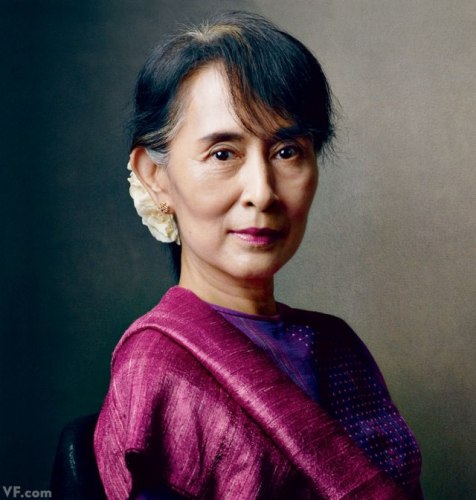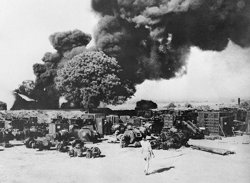Hello all! After a brief respite and working on contracts, I'm back looking at the history in current events through my own slightly fractured abnormal lenses.
Because
this is normal where I'm from.
|
This week in world events, something is happening I never thought I would see: Burma opposition leader Aung San Suu Kyi's party said Monday that it had won 56 of the 57 parliamentary seats from Burma's main city of Rangoon, a result that portends a massive sweep in historic elections that could eventually give it the presidency next year.
CBC reports that "the National League for Democracy announced that it had won 44 of the 45 lower house seats and all 12 of the upper house seats from Rangoon, a party stronghold, in Sunday's general election. It also won 87 of the 90 seats in the Rangoon state legislature. Elections for regional parliaments were held simultaneously."
About 30 million people are eligible to vote for more than 90 parties that are contesting. The main fight is between the National League for Democracy, led by Nobel Peace laureate Aung, and the ruling Union Solidarity Development Party, made up largely of former junta members. A host of other parties from ethnic minorities, who form 40 percent of the country's 52 million people, are also running.
And why we should give two owls about this?
We
only care about the pretty
countries under military rule.
|
As usual, history has screwed Burma so much, and these people deserve the chance to finally have the rights we do. In other words, freedom in all forms, including forking up their own country and not someone else always doing it to them. They may finally be freeing itself from the stranglehold of the military, which ruled the country for a half-century until 2011.
Hang on to your hats: the primer on Burma's "Highlights of History" are here! Remember kids, everyone dies, horribly. So don't say I didn't warn you.
The double tap of Mongols and British Rule
Way back in 1057,King Anawrahta founds the first unified Myanmar state at Pagan and adopts Theravada Buddhism. But nothing was untouched by the Mongols anywhere: in the late 1280s they conquered Pagan and ran it till 1531, when the nation of Burma was formed. And like the Mongols, things get crazy when the British show up. From 1824-26 the First Anglo-Burmese war ends with the Treaty of Yandabo, according to which Burma ceded the Arakan coastal strip, between Chittagong and Cape Negrais, to British India. They took the rest in 1852 as Britain annexes lower Burma, including Rangoon, following the second Anglo-Burmese war. Burma becomes a province then a crown colony of Britain.
During WWII, the Japanese tried to copy the Mongols (that whole militarism thing) and Britain (the whole colonialism thing) and take Burma. The Burmese people rose up and were ‘liberated’ by the British. Aung San and six members of his interim government were assassinated by political opponents led by U Saw, a nationalist rival of Aung San's. U Nu, foreign minister in Ba Maw's government, which ruled Burma during the Japanese occupation, asked to head the AFPFL and the government. England now looks at the chaos of what they have partly been responsible for and as per usual, fork off. Burma gets independence in 1948.
And now the infighting starts….
In 1960 U Nu's party faction wins decisive victory in elections, but his promotion of Buddhism as the state religion and his tolerance of separatism angers the military. U Nu's faction ousted in military coup led by Gen Ne Win, who abolishes the federal system and inaugurates "the Burmese Way to Socialism" - nationalising the economy, forming a single-party state with the Socialist Programme Party as the sole political party, and banning independent newspapers. Many minority groups begin their fight against the government including the Shan, who up till very recently were still kick can all over the place.
Fast forward to the 1980s and the people are pissed. A currency devaluation wipes out many people's savings and triggers anti-government riots. Thousands of people are killed in anti-government riots. Martial Law is declared, arrests thousands of people, including advocates of democracy and human rights, and the country is renamed 'Myanmar'.
 |
Our heroine enters?
NLD leader Aung San Suu Kyi, the daughter of Aung San, is put under house arrest for her whole “I like democracy” button collection. After years of absolute bull-crap including multiple arrests, and no chance of seeing her dying British husband in the UK unless she concedes to these right wing nut jobs in uniform, Aung finally gets out in 2002. However, not all is rosy in the country as activists are continually arrested including Buddhist monks, who are not down with the whole “Do what I say or I’ll kill you deal” they keep getting.
Finally, it takes a fucking cyclone to get the government to move towards democracy. Cyclone Nargis hits in 2008. Some estimates put the death toll as high as 134,000. Referendum on new constitution proceeds amid humanitarian crisis following cyclone. Government says 92% voted in favour of draft constitution and insists it can cope with cyclone aftermath without foreign help. After a few more deaths – like 1000s – and more house arrests, the Banana Republic of Asia Called Myamar finally gets a break. In 2011, pro-democracy leader Aung says she will stand for election to parliament, as her party rejoins the political process. Myanmar abolishes pre-publication media censorship. The hard liners are either dead or removed from power.
 |
Pictured:
Aung San Suu Kyi. She's just plain awesome.
|
Now What?
Current President Thein Sein dismisses rival Shwe Mann and allies from leading roles in ruling Union Solidarity and Development Party. Opposition leader Aung says ready to work with Shwe Mann, and she wins the most seats!
This does not mean things are going to be ok: these people lived through civil war, famine and death, a military run government with no freedoms, and they seriously have a country to re-build. But at least now they have hope.
Aung San Suu Kyi.



No comments:
Post a Comment